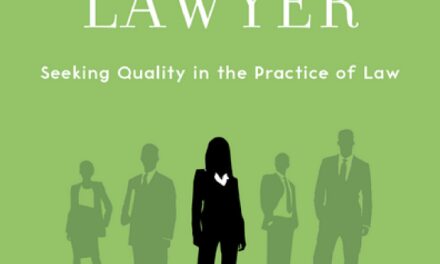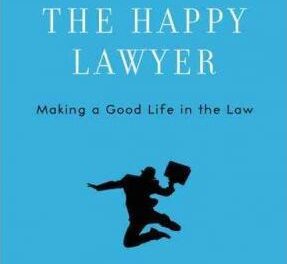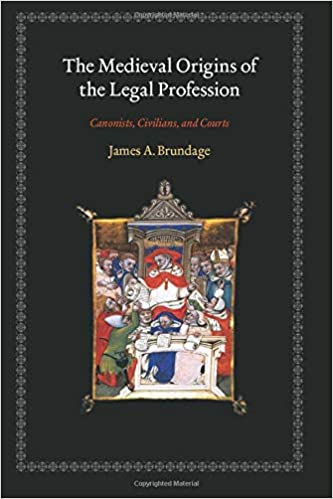Some General Approaches
Part IIIA
I. Preface
I will say a number of critical things about this part of THE HAPPY LAWYER. I ask the reader to be clear about who or what I am criticizing here. I admire much of the book and, I think, all the work of the Authors. My criticism is of the underlying ideas. They have been important in Western psychology and philosophy until the Twentieth Century, and most of the criticism set forth then was misguided bullshit. The problem for our Authors is that the underlying ideas are so pervasive, in a large majority of Western Thought, about the nature of man and about necessary, proper, and effective responses. Unfortunately, even most of the critics of the “Pervasive Theory” who got their criticisms right, used a vocabulary and set of ideas that most of us could not understand. That is certainly true of me. This book suffers from none of those problems.
I. Some General Approaches
Some of the “You stand a good chance of making yourself happier if you work at it” idea: is tied to the six most important universal facts about human “happiness needs.” Without their participation in–or integration into–a person’s very being, s/he will be noticeably unhappy. The authors assert that these are universal human needs. I have already listed them, but here is the list again:
- Security
- Autonomy
- Authenticity
- Relatedness
- Competence
- Self-Esteem
It seems obvious that if these are the “universal needs,” they are “universal” because no one can “thrive” without them. Hence, in striving to make one’s self happier, one should try to attain all six of these.
MSQ: It is hard to resist the idea that these are important states of affairs, as far as the psyche is concerned. Many of them are involved in the happiness of many people, most of the time. Nevertheless, for me, they are difficult concepts to work within a “make yourself happier program.” How does one determine what one is pursuing? What is the real meaning of the term “autonomy”? What is the essence of the concept or idea?
MSQ: When I play chess, my self-esteem is diminished; I have very poor concentration. Would it be a good idea for me to play chess whether I like it or not? Surely I can handle the suffering inflicted on my self-confidence in this concept, to gain it perhaps in another way.
MSQ: People ask me, from time to time, how I have stuck with jobs I did not like. I have said to them, “You do not have to like what you do something all the time, you just have to do it.” I’m right about this, at least some of the time, and what I say hinges on the “have to” situation, together with the degree of difficulty of “liking it,” and, in addition–on whether anyone is depending on you, and if so, how many, etc.–and what will be the consequences for them if I walk out. This is the kind of beating self-esteem must take sometimes. Indeed, if sometimes one does not put up with it, one’s sense of relatedness and authenticity will be injured. What I have just asserted is true for all of the combinations of two or more on the list. Of course, anything can be overdone.
MSQ: As for my experience is concerned, gloominess and warrantless criticism, even from “idiots,” are both very difficult to handle. They are hard for me, even though I belong to a network the main characteristic of which is relatedness. Thus, one of the principal causes of unhappiness is depression. I am not at all sure how its opposite fits onto what would be the “Big Seven,” if I were right. (Frankly, I’m not sure what the opposite of depression might be if it were anything but “non-depression,” and that idea is not very helpful.) I shall turn to this topic later, but it is not at all clear to me how people can cure themselves, or even be cured, of depression. For me, and for many others, that is one of the great mysteries of getting toward, achieving, and holding on to a happy life. Of course, not all people—and certainly not many lawyers—suffer from depression. Having a streak of the negative is for a lawyer, a good thing, even if the clients do not want to hear about it.] Caution and consequently prudence, often a good thing in lawyering, are deeply interconnected.
MSQ: Are there other things that belong on the “Big Six List”? What about the following?
7. Opposite of depression (already discussed)
8. Willingness to Sacrifice
9. Enviable Stability
10. Knowledge
11. Rationality/Reasonable
And, of course, there may be others.
MSQ: In any case, and this is my guesswork, a good deal of the advice the Authors suggest, involves these steps. (1) Set forth a meaning for each of these categories, at least as they apply to you. (2) Determine what constitutes at least a modicum of achievement for you, on each of them, where there is not already satisfaction. (3) Pursue them with the right level of effort for you. (4) Take on—whether one at a time or in groups—whatever you believe is reasonable, after asking yourself appropriate questions and thinking about them.
Now, there is one more topic to consider regarding this list. How can they be focused on one’s relationship to one’s being a lawyer, where, when, what kind, and so forth? Of course, some of the assertions about these questions will reflect both more glitter and more lead than the general applications of the ideas.







Recent Comments